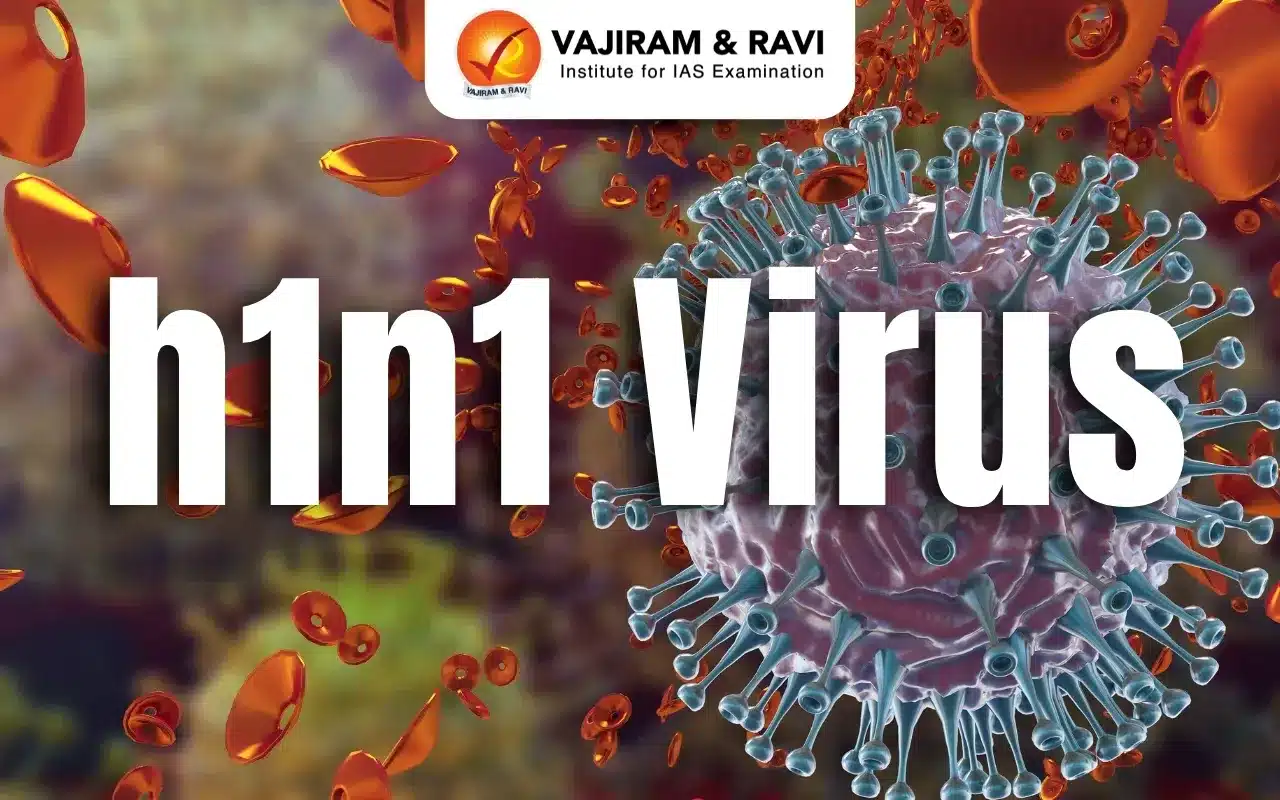H1N1 Virus Latest News
Delhi is seeing a significant rise in seasonal flu cases, with Influenza B and H1N1 leading to upper respiratory infections characterized by prolonged symptoms and persistent high fevers.
About H1N1 Virus
- Swine Influenza (swine flu) is a respiratory disease of pigs caused by type A influenza viruses that causes regular outbreaks in pigs. People do not normally get swine flu, but human infections can and do happen.
- Swine flu viruses have been reported to spread from person-to-person, but in the past, this transmission was limited and not sustained beyond three people.
- First case in India: The first confirmed case of H1N1 in India was reported in May 2009. Since then, the virus has caused several outbreaks, with significant case numbers recorded in 2021, 2022, 2023 and now more recently.
- Transmission: Flu viruses are spread mainly from person to person through coughing or sneezing of people with influenza. Sometimes people may become infected by touching something with flu viruses on it and then touching their mouth or nose.
- Symptoms:
- The symptoms of swine flu in people are similar to the symptoms of regular human flu and include fever, cough, sore throat, body aches, headache, chills and fatigue.
- Some people have reported diarrhea and vomiting associated with swine flu. In the past, severe illness (pneumonia and respiratory failure) and deaths have been reported with swine flu infection in people.
- Treatment: There is no vaccine available right now to protect against swine flu. There are everyday actions that can help prevent the spread of germs that cause respiratory illnesses like influenza.
H1N1 Virus FAQs
Q1. Q1: Is H1N1 a serious disease?
Ans. Yes, H1N1 can cause serious respiratory illness, especially in young children, elderly people, and those with weak immunity.
Q2. Is H1N1 a pig or bird virus?
Ans. H1N1 originated from pigs but also contains genetic material from bird and human influenza viruses.
Q3. How long does H1N1 last?
Ans. H1N1 symptoms usually last 3 to 7 days, but cough and weakness may persist for up to two weeks.
Q4. Does H1N1 need isolation?
Ans. Yes, isolation is recommended to prevent the spread of H1N1, especially for the first 5 to 7 days of infection.
Source: Mint
Last updated on November, 2025
→ Check out the latest UPSC Syllabus 2026 here.
→ Join Vajiram & Ravi’s Interview Guidance Programme for expert help to crack your final UPSC stage.
→ UPSC Mains Result 2025 is now out.
→ UPSC Notification 2026 is scheduled to be released on January 14, 2026.
→ UPSC Calendar 2026 is released on 15th May, 2025.
→ The UPSC Vacancy 2025 were released 1129, out of which 979 were for UPSC CSE and remaining 150 are for UPSC IFoS.
→ UPSC Prelims 2026 will be conducted on 24th May, 2026 & UPSC Mains 2026 will be conducted on 21st August 2026.
→ The UPSC Selection Process is of 3 stages-Prelims, Mains and Interview.
→ UPSC Result 2024 is released with latest UPSC Marksheet 2024. Check Now!
→ UPSC Prelims Result 2025 is out now for the CSE held on 25 May 2025.
→ UPSC Toppers List 2024 is released now. Shakti Dubey is UPSC AIR 1 2024 Topper.
→ UPSC Prelims Question Paper 2025 and Unofficial Prelims Answer Key 2025 are available now.
→ UPSC Mains Question Paper 2025 is out for Essay, GS 1, 2, 3 & GS 4.
→ UPSC Mains Indian Language Question Paper 2025 is now out.
→ UPSC Mains Optional Question Paper 2025 is now out.
→ Also check Best IAS Coaching in Delhi

















